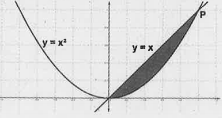Suppose that a spherical balloon is inflated and it has volume 'v' and radius 'r' at time 't'.
If the balloon is inflated by pumping 900c.c. of gas per second. Find the rate at which the radius of the balloon is increasing when the radious is 15 cm.Solution in Malayalam
Step by step video & image solution for Suppose that a spherical balloon is inflated and it has volume 'v' and radius 'r' at time 't'. If the balloon is inflated by pumping 900c.c. of gas per second. Find the rate at which the radius of the balloon is increasing when the radious is 15 cm. by Maths experts to help you in doubts & scoring excellent marks in Class 12 exams.
Updated on:21/07/2023Topper's Solved these Questions
Similar Questions
Consider the following figure
find the point of intersection (P) of the parabola and the line.

View SolutionA balloon which always remains spherical, is being inflated by pumping in 900 cubic centimetres of gas per second. Find the rate at which the radius of the balloon is increasing when the radius is 15 cm.
View Solutionएक गुब्बारा जो सदैव गोलाकार रहता है एक पंप द्वारा 900cm3 गैस प्रति सेकंड भरकर फुलाया जाता है| गुब्बारे की त्रिज्या के परिवर्तन की दर ज्ञात कीजिए जब त्रिज्या 15 cm है|
View Solutionएक गुब्बारा जो सदैव गोलाकार रहता है, एक पम्प द्वारा 900 घन सेमी. गैस प्रति सेकण्ड भर कर फुलाया जाता है । गुब्बारे की त्रिज्या परिवर्तन की दर ज्ञात कीजिए, जब त्रिज्या 15 सेमी. है।
View SolutionA balloon which always remains spherical on inflation is being inflated by pumping in 900 cubic centimeters of gas per second. Find the rate at which the radius of balloon increases when the radius in 15 cm.
View SolutionA balloon which always remain spherical on inflation, is being inflated by pumping in 900 cubic cm of gas per second. Find the rate at which the radius of the balloon increases when the radius is 15 cm.
View SolutionA balloon, which always remains spherical on inflation, is being inflated by pumping in 900 cubic centimetres of gas per second. Find the rate at which the radius of the balloon increases when the radius is 15 cm.
View SolutionA balloon, which always remains spherical on inflation, is being inflated by pumping in 900 cubic centimetres of gas per second. Find the rate at which the radius of the balloon increases when the radius is 15 cm.
View SolutionA balloon, which always remains spherical on inflation, is being inflated by pumping in 900 cubic centimetres of gas per second. Find the rate at which the radius of the balloon increases when the radius is 15 cm.
View SolutionA balloon which always remains spherical on inflation is being inflated by pumping in 900 cubic centimeters of gas per second. Find the rate at which the radius of balloon increases when the radius in 15 cm.
View SolutionA balloon, which always remains spherical on inflation, is being inflated by pumping in 900 cubic centimetres of gas per second. Find the rate at which the radius of the balloon increases when the radius is 15 cm.
View SolutionA balloon, which always remains spherical on inflation, is being inflated by pumping in 900 cubic centimetres of gas per second. Find the rate at which the radius of the balloon increases when the radius is 15 cm.
View SolutionA balloon which always remains spherical, is being inflated by pumping in 900 cubic centimetres of gas per second. Find the rate at which the radius of the balloon is increasing when the radius is 15 cm.
View SolutionA balloon, which always remains spherical on inflation, is being inflated by pumping in 900 cubic centimetres of gas per second. Find the rate at which the radius of the balloon increases when the radius is 15 cm.
View SolutionA balloon which always remains spherical on inflation is being inflated by pumping in 900 cubic centimeters of gas per second. Find the rate at which the radius of balloon increases when the radius in 15 cm.
View Solution
